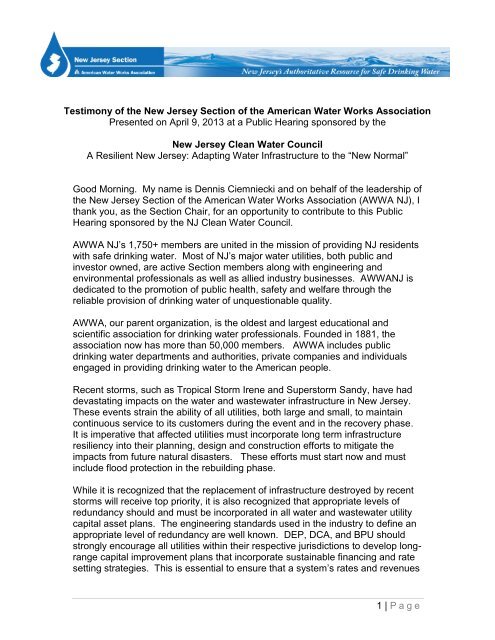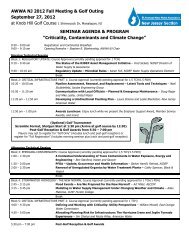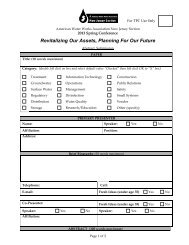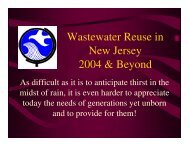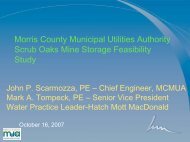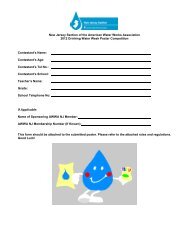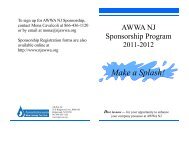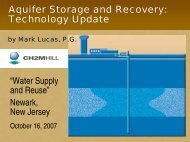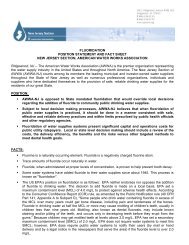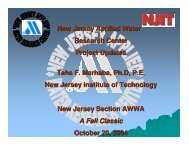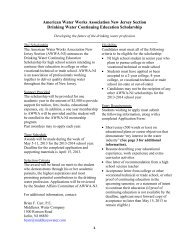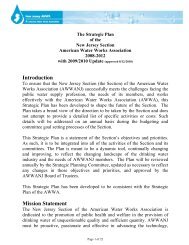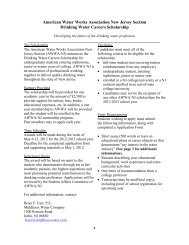HERE - American Water Works Association
HERE - American Water Works Association
HERE - American Water Works Association
You also want an ePaper? Increase the reach of your titles
YUMPU automatically turns print PDFs into web optimized ePapers that Google loves.
Testimony of the New Jersey Section of the <strong>American</strong> <strong>Water</strong> <strong>Works</strong> <strong>Association</strong>Presented on April 9, 2013 at a Public Hearing sponsored by theNew Jersey Clean <strong>Water</strong> CouncilA Resilient New Jersey: Adapting <strong>Water</strong> Infrastructure to the “New Normal”Good Morning. My name is Dennis Ciemniecki and on behalf of the leadership ofthe New Jersey Section of the <strong>American</strong> <strong>Water</strong> <strong>Works</strong> <strong>Association</strong> (AWWA NJ), Ithank you, as the Section Chair, for an opportunity to contribute to this PublicHearing sponsored by the NJ Clean <strong>Water</strong> Council.AWWA NJ’s 1,750+ members are united in the mission of providing NJ residentswith safe drinking water. Most of NJ’s major water utilities, both public andinvestor owned, are active Section members along with engineering andenvironmental professionals as well as allied industry businesses. AWWANJ isdedicated to the promotion of public health, safety and welfare through thereliable provision of drinking water of unquestionable quality.AWWA, our parent organization, is the oldest and largest educational andscientific association for drinking water professionals. Founded in 1881, theassociation now has more than 50,000 members. AWWA includes publicdrinking water departments and authorities, private companies and individualsengaged in providing drinking water to the <strong>American</strong> people.Recent storms, such as Tropical Storm Irene and Superstorm Sandy, have haddevastating impacts on the water and wastewater infrastructure in New Jersey.These events strain the ability of all utilities, both large and small, to maintaincontinuous service to its customers during the event and in the recovery phase.It is imperative that affected utilities must incorporate long term infrastructureresiliency into their planning, design and construction efforts to mitigate theimpacts from future natural disasters. These efforts must start now and mustinclude flood protection in the rebuilding phase.While it is recognized that the replacement of infrastructure destroyed by recentstorms will receive top priority, it is also recognized that appropriate levels ofredundancy should and must be incorporated in all water and wastewater utilitycapital asset plans. The engineering standards used in the industry to define anappropriate level of redundancy are well known. DEP, DCA, and BPU shouldstrongly encourage all utilities within their respective jurisdictions to develop longrangecapital improvement plans that incorporate sustainable financing and ratesetting strategies. This is essential to ensure that a system’s rates and revenues1 | P a g e
support the full cost of both capital improvements and ongoing operations. Inaddition, all three regulatory agencies should strongly encourage utilities that donot have current and updated emergency response plans to quickly developand/or update such plans. DCA should also focus its review of municipal waterand wastewater budgets on the diversion of revenues and reserve fundsintended for water and sewer improvements to other municipal functions.Ratepayer dollars collected to improve and renew water and sewer infrastructureshould not be reallocated through the budgeting process to activities unrelated tothese utility services.DEP and DCA must also assure that the regulatory approval process isstreamlined to minimize any delays to the rebuilding process. Regulatory delayscan allow damaged utility assets to degrade further, which may lead to furtherinterruptions in service.<strong>Water</strong> and wastewater utility services must remain functional at all times in orderto ensure assure the protection of public heath, safety and the environment.Unfortunately, the power grids serving the State are often severely damaged bynatural disasters like Irene and Sandy. Extended power outages have immediateand severe impacts on water and wastewater utilities. Therefore, back-up powersupplies are critical to utility operations. Diesel and natural gas fueled electricalgenerators are typically utilized by utilities in emergency power operations.However, when the availability and delivery of diesel or natural gas is limited,alternate procurement and delivery systems must be considered. DEP iscommended for their efforts in assisting in the procurement and delivery of dieselfuel during Superstorm Sandy. DEP and DCA must assist utilities in theinvestigation and development of alternate fuel sources, procurement methodsand delivery systems.Respectfully submitted,New Jersey Section<strong>American</strong> <strong>Water</strong> <strong>Works</strong> <strong>Association</strong>38 East Ridgewood Avenue, PMB 183Ridgewood, NJ 07450(866) 436-11202 | P a g e


